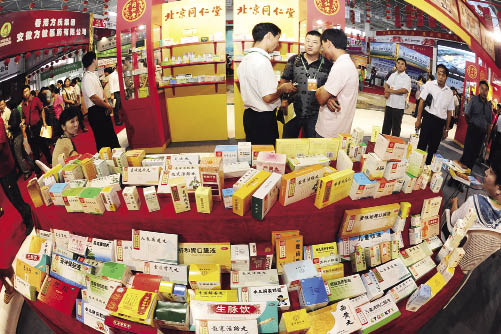|
In the past, traditional Chinese medicines were sold as food or tonics, but with registration and approval, they can be sold as drugs. This situation, Huang points out, will actually help to expand the TCM market in Europe, guarantee the quality of drugs and enhance the good reputation of TCM.
In Sun's estimation, most firms are not ready for the application process as they believed the domestic market was already vast enough and paid little attention to the overseas market, with the exception of Southeast Asia. What's more, difficulties understanding the laws and regulations of North America and Europe also set these companies back.
"It is tough for a company to register successfully by relying only on its own technical strength," Sun explains. "In addition, registration is very expensive." He gauges the total registration cost for a single-ingredient product is in the ball park of RMB 5 million, not to mention those for compounded ingredient drugs.
In spite of this, Sun expects Foci's medicines will finally be approved by the EU, and the company is preparing to make applications for even more products. "We are confident with the results, that's why we began the second round of applications while our first product was still in the approval process," Sun affirms.
Standardization Inevitable
 |
|
Standardization for TCM is a daunting project that must be accomplished in several stages. Photos by China Foto Press |
According to Huang Jianyin, EU countries implement the Directive differently due to the status of the legislation and the administrative pattern of the union.
The EU has four ways to regulate medicines – stipulations, directives, decisions and proposals. In terms of directives, EU has set a management objective but the member countries are allowed to carry it out in accordance with their own circumstances. For example, the Netherlands does not implement the Directive at present. And in the case of TCM, the Directive itself applies only to patent medicines; ready-for-use prepared herbs and single ingredient granules can still be sold as food or dietary supplements.
Huang Jianyin suggests TCM companies focus on long-term prospects. Traditional Chinese medicine is always regarded as complementary to the practice of medicine in Western countries. For example in the U.S., no traditional Chinese medicine has passed the FDA's examination and none can be used as medicine in this country.
According to Huang, apart from cultural differences, TCM is hard pressed to be accepted on par with pharmaceuticals in Western countries since TCM companies have not gone far enough to prove either the safety or the effects.
It has been revealed from time to time in recent years, that certain products contained heavy metals exceeding the allowable standard. Therefore, an international standard for TCM is an absolute necessity.
In 2010, in cooperation with the International Standardization Organization (ISO), the State Administration of Traditional Chinese Medicine of China set up a technical committee to formulate international standards for TCM. Traditional Chinese medicines are very strict with respect to ingredient compatibility. Therefore standardization is a daunting project that must be accomplished in several stages.
On December 3, 2010, the Chinese Medicine Ordinance was put into effect in Hong Kong. From that point on, prepared Chinese medicines that failed to register were banned on the Hong Kong market. More and more countries and regions are enacting these sorts of regulations for traditional Chinese medicines. In a sense, it gears up the standardization development of TCM and improves the products' safety.
In 2010, China's exports of TCM products were US $1.944 billion, of which ready-for-use prepared herbal products were US $776 million. Though patent traditional medicines were sold to 143 countries and regions worldwide, the export value was only US $193 million.
According to Sun Yu, North America is the largest purchaser of Foci products while Europe imports the least. But Sun values the technical benefits they will gain from the new rule that enables it to present its products as drugs in Europe, a region which excels in herbal drug research. Sun hopes that with technical support from the EU, they can find some connection between TCM and other herbal drugs so as to boost the development of TCM itself.
To Sun's delight, more and more overseas consumers, including Europeans, have begun to accept traditional Chinese medicine and trust its curative effects. Many overseas educational institutions are training traditional Chinese medicine practitioners as well.
"Today, as antibiotics are being more and more abused, people are turning to herbal medicines. At the same time, Western medicines are proving to be slow in developing effective treatments for cancer and AIDS. It's a chance for TCM to grow," Sun concludes. | 